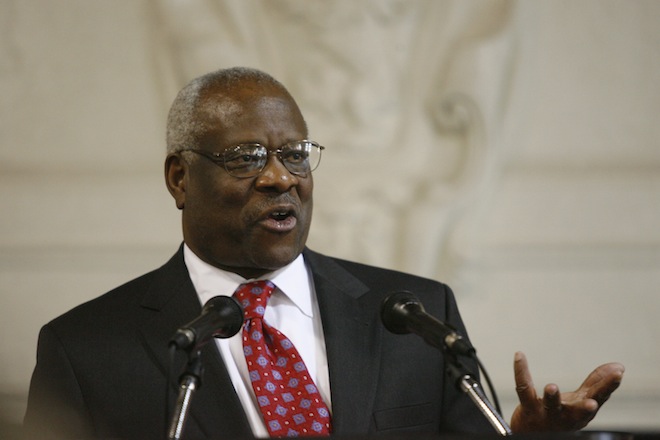Marriage equality advocates are eyeing the vote of one of the country’s most predictable enemies of liberalism in a blockbuster case about the constitutionality of the Defense of Marriage Act: Supreme Court Justice Clarence Thomas.
His support is far from certain. But it’s surprisingly plausible. Though he’s often derided for, and defined by, his conspicuous silence during oral arguments, Thomas’ fealty to ideological first principles is stronger and more consistent than any of the other conservative justices’. And in the DOMA case, a key question has become whether marriage should be the province of states, drawing upon a federalist principle at the core of conservative legal jurisprudence.
In this case, his storied record against federal power appears to line up neatly with an argument, backed by some conservative and libertarian scholars, for overturning the Defense of Marriage Act — a law that denies federal benefits to married gay couples.
Randy Barnett, a libertarian Georgetown law professor who signed a brief with other federalist scholars seeking to overturn DOMA on states rights grounds, sees Thomas as winnable.
“It would certainly not surprise me if he became a sixth vote for a federalist repudiation of DOMA,” Barnett told TPM, positing that Thomas may side with the four liberal justices and Justice Anthony Kennedy in such a decision. “But I can’t predict what he’ll do.”
For DOMA, Thomas’ vote isn’t a gimme. Paul Clement, the GOP’s superstar lawyer tasked with defending the 1996 law, dedicated a portion of his oral argument to advancing the view that it doesn’t violate states’ rights. His stance, which some court watchers believe will sway Thomas, was that Congress has the authority to define marriage as a union between a man and a woman for the purposes of providing federal benefits.
“This is a case where there are a lot of conservatives who are with federal power. There are arguments to be made on the other side,” Barnett said. “I don’t know that it’s easy to predict what any person with a commitment to federalism will say [with regard to DOMA].”
Lyle Denniston, a longtime Supreme Court analyst who writes for the award-winning SCOTUSblog, doesn’t believe Thomas is a winnable vote to strike down DOMA.
“I don’t think he wants to endorse same sex marriage in any way,” Denniston said, predicting that Thomas will conclude DOMA doesn’t violate states rights or the Constitution’s equal protection clause. “It might not be consistent with his view generally on power of the states but it would sustain the ban on same sex marriage and I think that’s where his heart is.”
Ilya Shapiro, a legal scholar at the libertarian Cato Institute, explained in an email that there’s a constitutional basis for validating DOMA apart from states rights. “The argument,” he wrote, “is that the federal government has a rational basis — or a legitimate/compelling reason, if the Court applies heightened scrutiny — for defining marriage as it does in DOMA.”
In other words, justices could hew to the view that DOMA effectively serves as a bookkeeping mechanism for the government — which after all must determine eligibility for federal benefits on some basis. But that argument isn’t persuasive to committed federalists, because they don’t believe that defining marriage is Congress’ prerogative in the first place.
The amicus brief written by Barnett and other federalist scholars describes the law as “an unconstitutional and unprecedented incursion into States’ police powers.” They conclude that “the Constitution best protects liberty of same-sex marriage proponents and opponents by guaranteeing each State the right to decide for itself.”
Thomas observed his customary silence during two days of oral arguments last week on DOMA and California’s ban on gay marriage, so we aren’t likely to determine his views until late June, when decisions are expected in both cases. But his opinion could be the biggest surprise in the winding legal fight for marriage equality.






